My Lifetime Love of Dogs and What is a Livestock Guardian Dog
I’d like to break this article into two parts. The first half my personal story with dogs and Livestock Guardian Dogs. The second half – some basic information on Livestock Guardian Dogs – their benefits and a few example breeds.
1st Half:
Dogs have been a source of fun, love, companionship and learning since I was a child. It seems like we always had dogs around. However, one of the first to stick out in my memory was Tigger. On a trip with a friend of my Mom’s to Vashon Island (I had to be about 9 years old) we were picking stuff up at someone’s house and they had this black and white scruffy almost Benji looking pup named Tigger. I was convincing enough to bring him home – made him a dog house and tied him up. But Tigger liked to run free, and did he ever. He’d always come home muddy and consistently happy. I loved that dog and think it planted the seed for dog friends going forward.
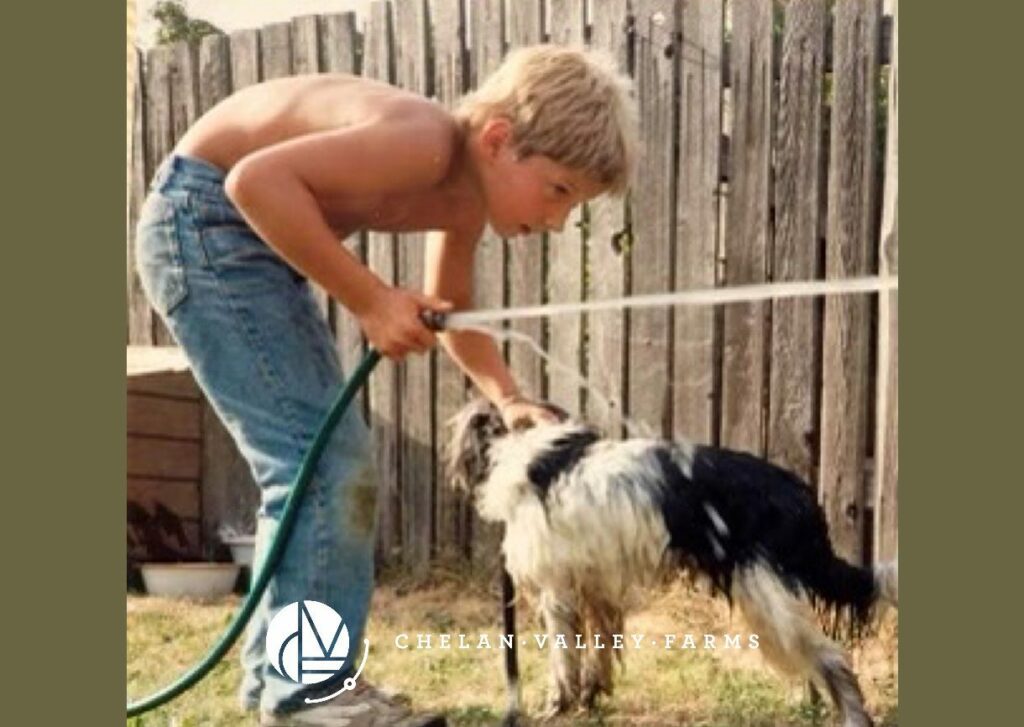
Chad and Tigger (mut).
The next dog came into the picture after a summer of saving and reading hunting dog training books, talking a breeder into letting me make payments – and then my first purebred black lab Mandy never left my side. At age 16 learning to train a bird hunting dog and having such an amazing companion is a great memory. She’d go to work with me in high school and ended up making it into the WSU Farmhouse Fraternity annual “house” picture with everyone’s individual pictures – she was “house dog”. From there I had the amazing opportunity to train German Shorthairs with someone I consider to be one of the kindest human beings (Robert Lopez) – amazing generosity and great teacher. Training dogs and bird hunting – let’s say partially caused me to have to explain an A, B, C, D, F grades to a future job interviewer because I was having fun in college bird hunting instead of studying in the fall.
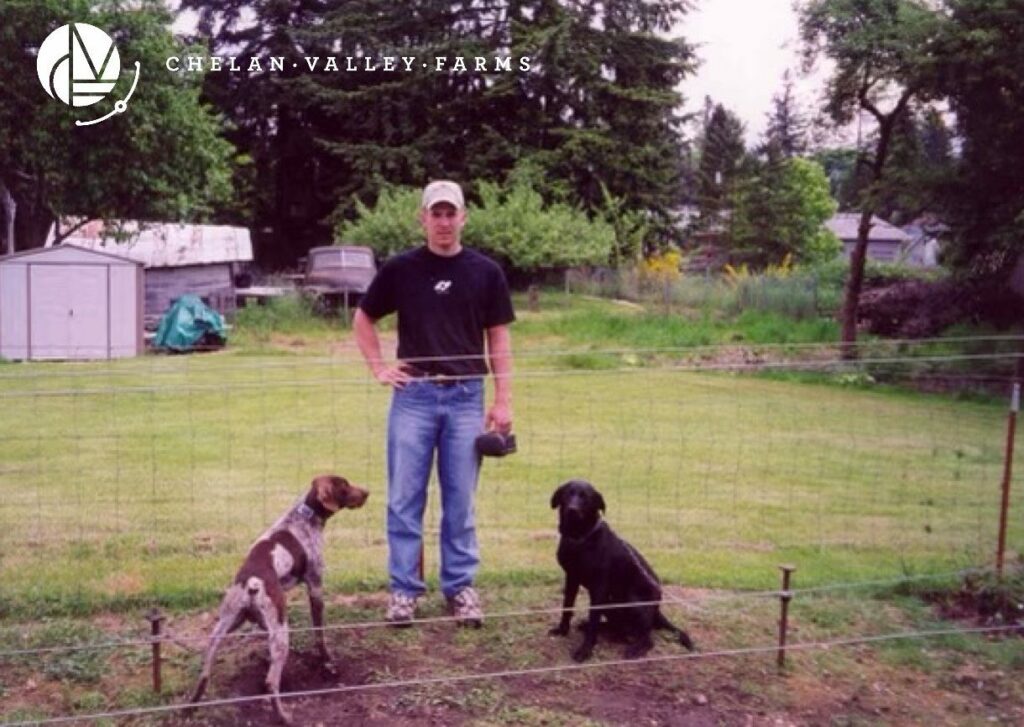
Chad’s first German Shorthair El and 2nd Black Lab Maggie
Fast forward – Jeana and I moved around the country with Syngenta and so did our solo dog of 16 years – a German Shorthair named Jack. He was one of the funnest pointing dogs I ever hunted over. Naturally held his points, retrieved and loved to stay close. Jack even got to hunt Bob White Quail when we lived in North Carolina (thanks Hal and Mike for the hunt camp trip).
Coincidentally, Jack visited doggy heaven the week before we loaded the U-Haul to move back to Washington State from California in 2018. It was like he knew there wouldn’t be enough room. I share all this in hopes many of you will remember your love for dogs and where it came from.
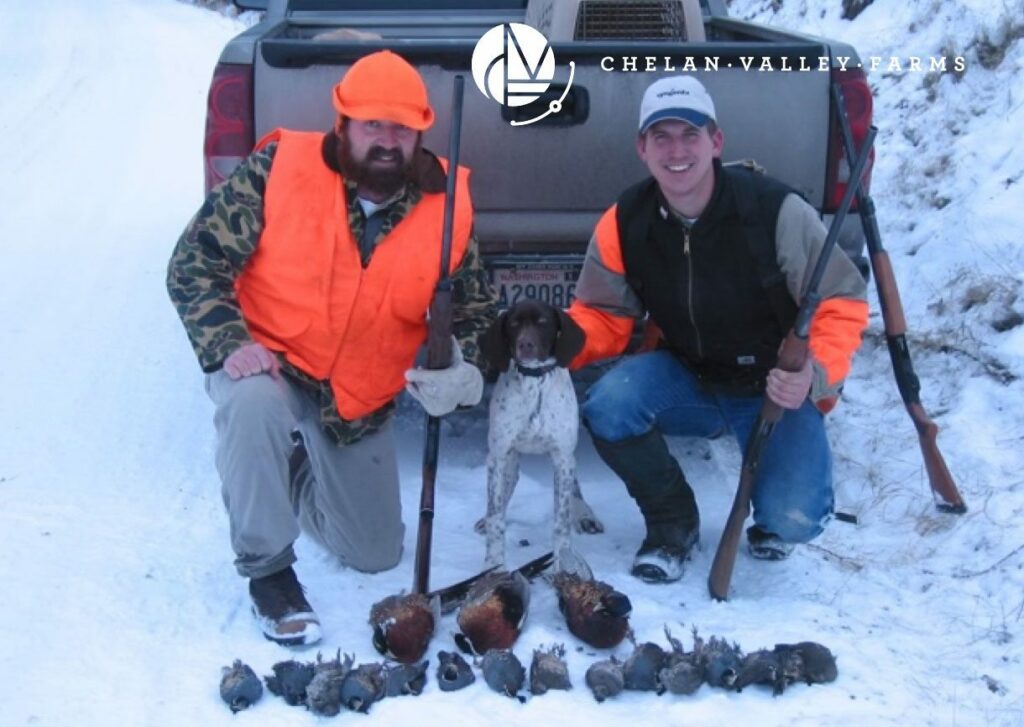
Chad’s Professor Joe Yenish and Jack after a fantastic hunt.
Moving to the farm in the summer of 2019 – we heard stories of predators like coyotes (of course they make themselves well known at night), cougars, bears and more recently wolves. The only one of these we’ve actually seen are coyotes. A couple things came to mind for Jeana and I – how can we have someone to look out for the boys (our boys are now 12, almost 10 and almost 8) and protect our animals (chickens and goats)? I’ll leave Bingo for future stories (he doesn’t fit into what I’m about to describe other than a wanna be LGD & provider of love). As a family we’d fell in love with the looks of a Bernese Mountain dog – but learned they have a shorter lifespan in some cases. Then we had some friends who had a Great Pyrenees (thanks Nate and Gill). And the exploration into Livestock Guardian Dogs (LGD’s) began. It so happened some local friends of ours were getting an LGD and there were litter mates available – enter Angel. She’s about 70% Anatolian Shepherd (more later) and 30% Great Pyrenees (more later).
From the beginning she’s patrolled the farm keeping an eye on things – until lately she seems to have accepted the role of parking lot greeter at the tasting room. But one night when she was about 1 year old, she tangled with some coyotes – they were no match (although Bingo seemed to enjoy being chased by them). Soon after I spoke with Angel’s breeder – she thought we needed another LGD and introduced us to the Karakachan (more later). Enter Bella. From the start Bella won our hearts and was also a great fit. Bella and Angel worked well together – either of them could be left with the chickens and the goats. Unfortunately, we lost Bella in a farm accident – we loved her. Now enter Jade. Another female Karakachan. She’s smaller but mighty and very attentive to even ravens trying to poke around. Coming full circle – its been quite interesting moving from hunting breeds to LGD’s. The LGD’s have really won me over. Their so gentle and can go from a nap to chasing a coyote faster than a Tesla. We’re so glad they’re here.
We’ve raised them with us and around people so they’ll be friendly to visitors on the farm. As we continue to bring more animals to the farm – they’re going to have even more purpose here. Bingo on the other hand – his sole purpose is to cultivate love and solicit pets from literally any willing hand. In other words he’s just a pet. On your next visit – feel free to say hello to our LGD’s. And maybe someday we’ll have pups to share.
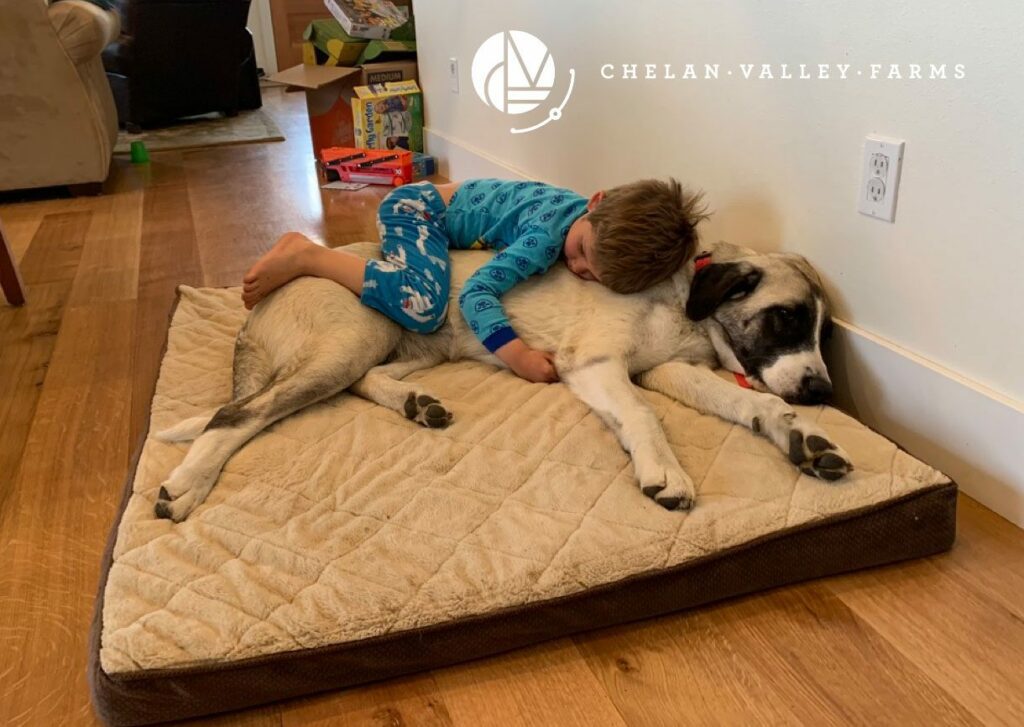
Angel (Pyrenees/Anatolian) has been a great fit with the boys. And she still fiercely guards the animals when she’s with them.
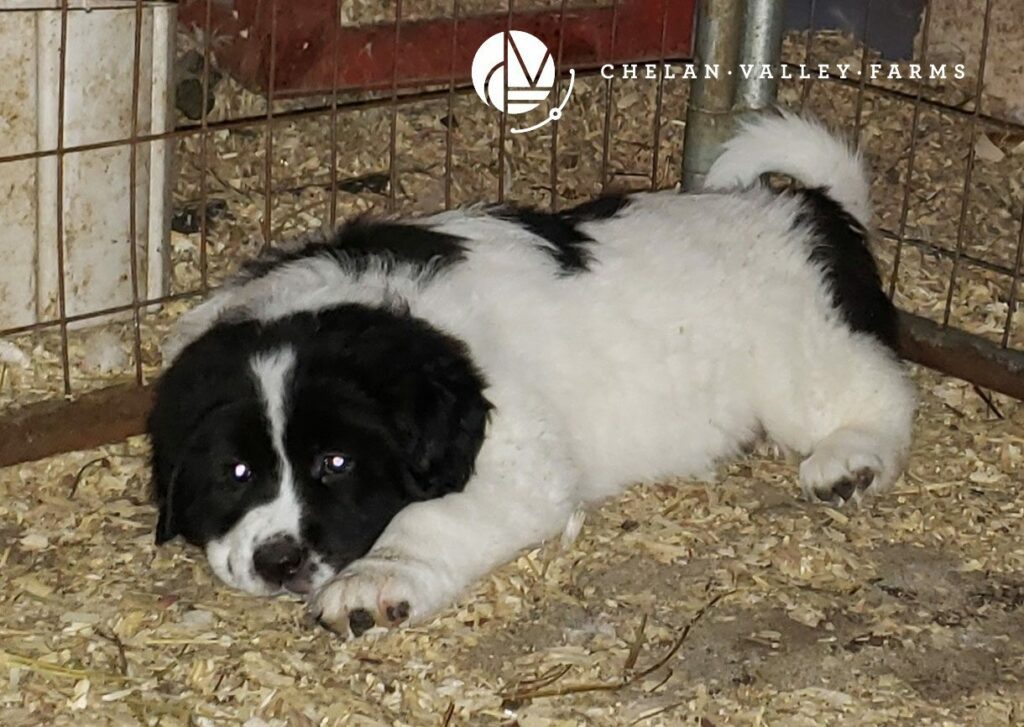
Puppy Bella (Karakachan)
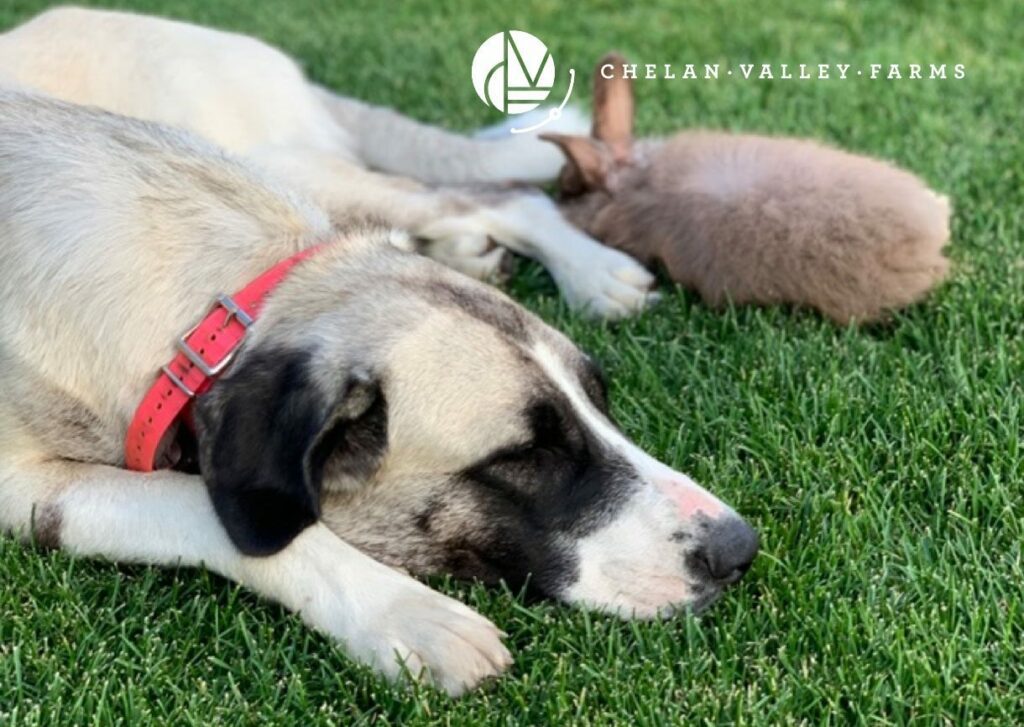
Angel keeping an eye on one of the rabbits.
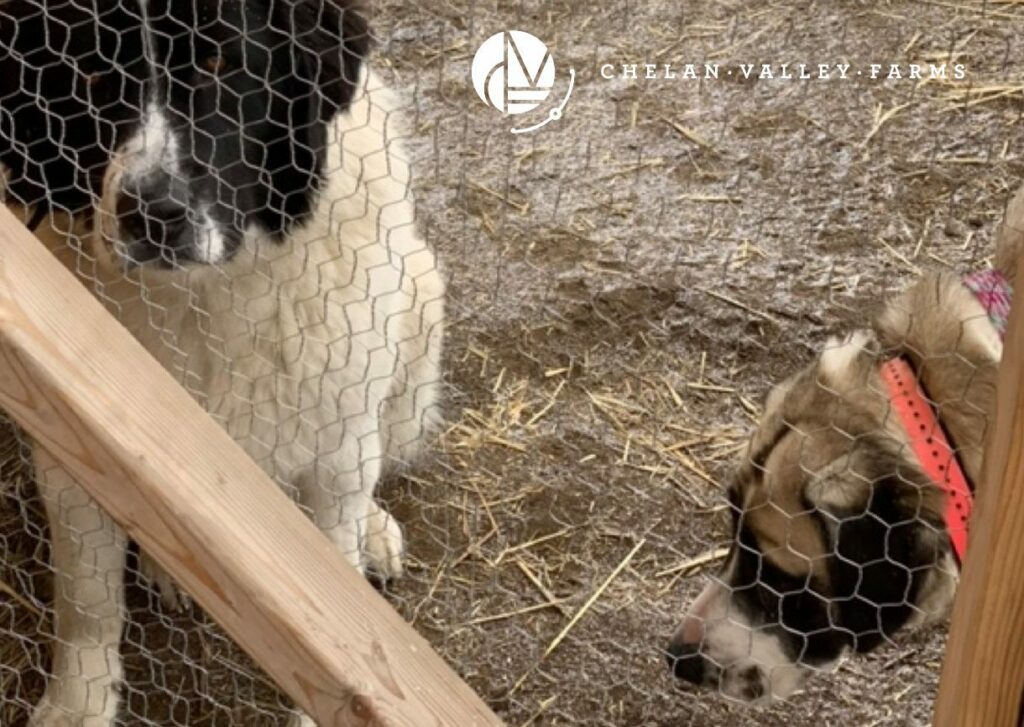
Bella (Karakachan) and Angel (Pyrenees/Anatolian) in with the chickens
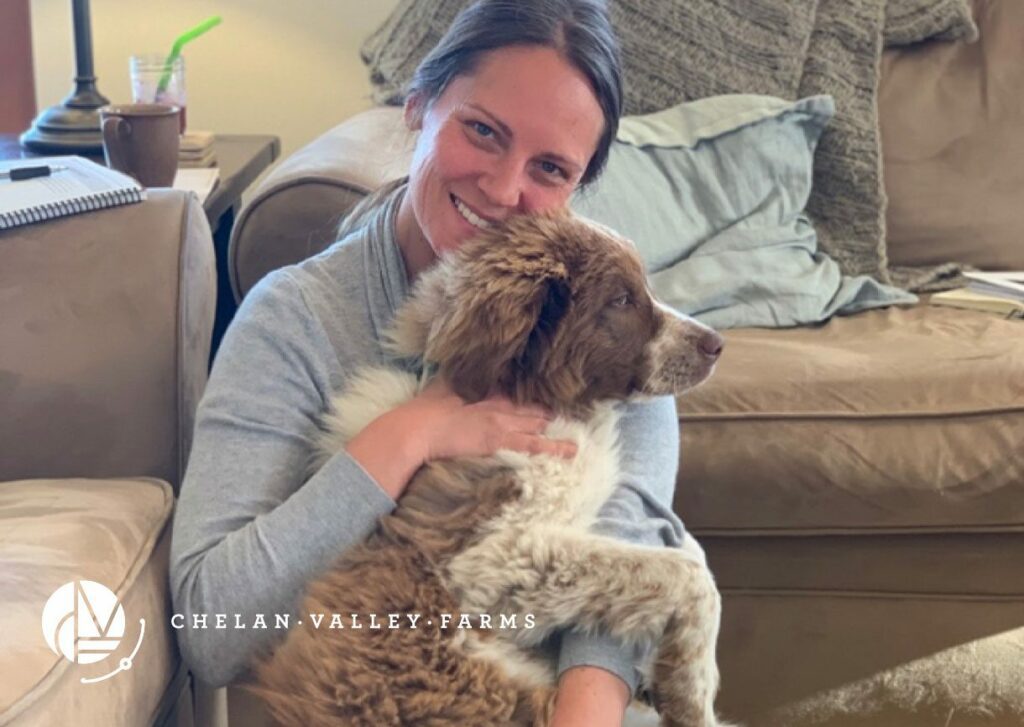
Welcome Jade (Karakachan) to the farm!
2nd Half:
Here are some ways LGDs can be helpful to your farm:
Protecting your livestock: One of the primary roles of LGDs is to protect your livestock from predators. These dogs will stay with your livestock 24/7, keeping a watchful eye on them and deterring any potential predators from coming near. This can greatly reduce the losses you may incur due to predation, especially during vulnerable times like when chickens are sleeping or when other larger animals are birthing their young.
Reducing stress on livestock: Predation can be very stressful for livestock. The presence of LGDs can reduce the stress levels of your livestock by making them feel more secure and protected. This can lead to improved health and productivity.
Saving you time and money: By reducing losses due to predation, LGDs can save you money in terms of replacement costs for lost livestock. Additionally, because LGDs are working dogs, they don’t require a lot of maintenance and can be less expensive to care for than other forms of predator control such as electric fencing.
Providing companionship: LGDs can make great companions for farmers and their families. They are loyal and affectionate dogs that can form strong bonds with their owners.
As for breeds of LGDs, there are several different types to consider. Some of the most common breeds include:
Great Pyrenees: These dogs are known for their gentle nature and their ability to protect livestock from predators. Our experience with Angel (part Pyrenees) is that she “patrols” the farm establishing a perimeter. Almost like she’s saying – “Hey, predators, I know you’re out there because I can smell so well, but this is MY boundary, this is my flock, don’t come in here (as she’s barking).” Yes, these dogs can bark – something to be mindful of. And they like to be out at night (we put her in when we have guests).
Anatolian Shepherds: Originally from Turkey, these dogs are strong, independent, and protective. Our experience with Angel is that the Anatolian is lovely and an absolute athlete. Its really fun to see Angel in action.
Maremma Sheepdogs: Originally from Italy, these dogs are known for their ability to work with sheep, but can also protect other types of livestock. The ones I’ve seen look much like the Great Pyrenees.
Akbash Dogs: These dogs are also from Turkey and are known for their independence and loyalty.
Komondor: This is a Hungarian breed that has a unique coat of dreadlocks. Komondors are fiercely protective and are particularly well-suited to protecting smaller livestock such as chickens. I listed this one because you’ve got to look them up. I couldn’t believe they’re an LGD.
Karakachan: This breed is originally from Bulgaria and is known for its strength and courage. Karakachans are particularly well-suited to protecting livestock from large predators such as bears and wolves. Our experience with both Bella and Jade – they like to stay with the herd. A great match up for Angel as she patrols. The Karakachan almost says “Hey, I’m so strong and so brave, mr or mrs predator – just try me, I’ll show you whose boss.” What we’ve also experienced is the immense love and happiness of these dogs. Both Bella and Jade were and are the first to come say hello in the morning and are always happy. At the same time, when it comes to protecting their flock – we’ve witnessed – they’re all business.
It’s important to note that LGDs are not suitable for every farm. They require a lot of space to roam and work, and they need to be properly trained and socialized from a young age. Additionally, LGDs may not be appropriate for farms with small or vulnerable livestock, as they can be quite large and strong. However, for many small farms, LGDs can be an effective and valuable tool for protecting their livestock and improving their overall farming operation.
I hope you’ve enjoyed some personal reflection as well as some information on Livestock Guardians. We’re so glad they found their way to our farm.
Cheers to more animals on the farm!
– Chad





Great info! I’ve seen the LGD’s at Tablas Creek. Such an important part of the working vineyard/farm.
Yeah, I believe they have Spanish Mastiffs. It appears they do a fabulous job for them. We’re really looking forward to seeing our girls have a bigger job in our grapes!
Thank you for this fun article Chad. We have a GREAT PYRENEES and love how she protects our flock. I’m so greatful you mentioned GP in your article- they tend to get a bad wrap with their barking. Luna has learned when it’s ok when to bark and when to payroll without barking.
We love Angel. She does such an amazing job. She’s so smart in how she watches over the farm.
There are guardian livestock dogs at Farmer Frog in Woodinville where I used to volunteer bagging potatoes for East West Food Rescue. Absolutely beautiful dogs. We were warned not to go into the chicken run or baby goats pen though as the GLD probably wouldn’t be very happy with us! 😀
Love how friendly and pettable your dogs are when they greet me at your farm.
Well – they are amazing breeds. So glad you’re greeted happily by the farm pups! And thank you for supporting us – we really appreciate it.